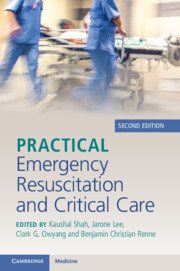Book contents
- Practical Emergency Resuscitation and Critical Care
- Practical Emergency Resuscitation and Critical Care
- Copyright page
- Contents
- Contributors
- Preface
- Section 1 General Critical Care
- Section 2 Infectious Disease Emergencies
- 5 Covid-19
- 6 Sepsis and Septic Shock
- 7 Pneumonia
- 8 Meningitis and Encephalitis
- 9 Infective Endocarditis
- 10 Necrotizing Soft Tissue Infections
- 11 Complications of Human Immunodeficiency Virus (HIV) and Acquired Immunodeficiency Syndrome (AIDS)
- Section 3 Neurological Emergencies
- Section 4 Cardiovascular Emergencies
- Section 5 Respiratory Emergencies
- Section 6 Gastrointestinal Emergencies
- Section 7 Renal Emergencies
- Section 8 Hematology–Oncology Emergencies
- Section 9 Endocrine Emergencies
- Section 10 Environmental Emergencies
- Section 11 Trauma
- Section 12 End of Life
- Index
- References
7 - Pneumonia
from Section 2 - Infectious Disease Emergencies
Published online by Cambridge University Press: 02 November 2023
- Practical Emergency Resuscitation and Critical Care
- Practical Emergency Resuscitation and Critical Care
- Copyright page
- Contents
- Contributors
- Preface
- Section 1 General Critical Care
- Section 2 Infectious Disease Emergencies
- 5 Covid-19
- 6 Sepsis and Septic Shock
- 7 Pneumonia
- 8 Meningitis and Encephalitis
- 9 Infective Endocarditis
- 10 Necrotizing Soft Tissue Infections
- 11 Complications of Human Immunodeficiency Virus (HIV) and Acquired Immunodeficiency Syndrome (AIDS)
- Section 3 Neurological Emergencies
- Section 4 Cardiovascular Emergencies
- Section 5 Respiratory Emergencies
- Section 6 Gastrointestinal Emergencies
- Section 7 Renal Emergencies
- Section 8 Hematology–Oncology Emergencies
- Section 9 Endocrine Emergencies
- Section 10 Environmental Emergencies
- Section 11 Trauma
- Section 12 End of Life
- Index
- References
Summary
Community-acquired pneumonia (CAP) is a pneumonia that is not acquired in a hospital but, as the name suggests, is acquired elsewhere. Usual pathogens include Streptococcus pneumoniae, Haemophilus influenzae, Mycoplasma pneumoniae, Staphylococcus aureus, Chlamydophila pneumoniae, Legionella pneumophila and Moraxella catarrhalis.
Healthcare-associated pneumonia (HCAP) is no longer recognized as a clinical entity by the 2019 ATS/IDSA Guidelines on the Management of Community-Acquired Pneumonia. HCAP designation did not uniformly predict drug-resistant organisms, so management is driven on an individual basis.
- Type
- Chapter
- Information
- Practical Emergency Resuscitation and Critical Care , pp. 63 - 69Publisher: Cambridge University PressPrint publication year: 2023

